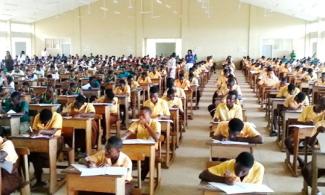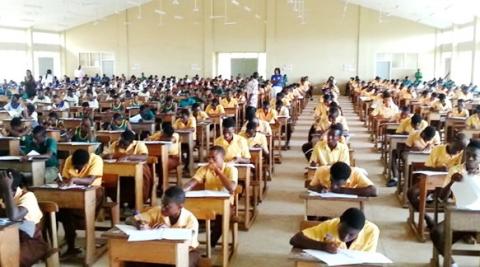
"In the case of the school examination, the prospective candidate must be in the SSS3 class in a recognized school," WAEC stated on its website in the frequently asked questions (FAQs) section. With the focus on the causes, effects and solution to the violation, this reporter interviewed school managements, students and experts."

Secondary school students in Nigeria now skip the last class of their secondary education to write the West African Senior Secondary Certificate Examination in SS2, the penultimate class. This exam was designed to be written by students who have completed the three-year syllabus for senior secondary education.
This paper found out that this does not only alter the system of education that makes senior secondary education three years but also violates West Africa Examination Council (WAEC) rules. "In the case of the school examination, the prospective candidate must be in the SSS3 class in a recognized school," WAEC stated on its website in the frequently asked questions (FAQs) section. With the focus on the causes, effects and solution to the violation, this reporter interviewed school managements, students and experts.
Andrew Agwor, the principal of Anuoluwapo Community Comprehensive High School (ACCHS), an unapproved but popular school in Ijoko, Ogun State, attributed the breach to the insensitivity of the parents. Mr. Andrew is a graduate of Ebonyi State University and an experienced teacher in the Science department. "Every parent wants their children to just pass the secondary stage of education so that they could boast about their child gaining admission into higher institution early, such a thing is not okay. But if a parent has the money, I wouldn't go against it," he said.
It was gathered that ACCHS had three penultimate students that participated in this just-written May/June WAEC examination. However, this correspondent could only speak to two students. Yinusa Bolu, a 15 years old student in SSS2 participated in the 2018 May/June WAEC examination with no prior knowledge of what would be taught in the final class and no experience in sitting the external examination. Mr. Andrew, when asked about the chances of the girl performing well in the exam, said "she is an outstanding student. With the help of the tutorials we've been doing, she should be fine." Afolabi Zainab, an older SSS2 student who Mr. Andrew confirmed to be average also participated in the examination. 19-year-old Zainab claimed it was her decision, supported by her parents.
Speaking on the effect of such, he said; "The truth of it all is that there is every tendency that if the student is a brilliant lad, he/she might pass. But the whole story is that most of them drop out after such WAEC. It means the level of knowledge is impaired. It affects them when they leave for higher institutions. The higher institution is for the mature. Your performance in the higher institution is still centred on how you fared in your secondary school."
Mr. Andrew argued that WAEC plays a huge role in this development. He criticized the body for their negligence and monetary focus. He also talked about the high level of malpractice being a contributive factor. "WAEC doesn't care, they are focused on the money. Anybody seen carrying an O level certificate cannot be equated to the result. Despite the obvious malpractice, the passing rate is still decent. The markers just want to mark and get their money."
The principal of Calvary Heritage College in Ogun state, Mr. Omoteji Omolayo noted that the situation is worse to the point which SS1 students, the introductory class - also participate in the exam. "There are students that sit for a standard Physics examination in SSS1, which is basically the introductory class. Developments like this play a significant role in the consistent average performance we keep pulling every year despite the high level of malpractice."
Also, the principal of Seventh Day Adventist School, Ile-Ife, Osun state Dr. Olarotimi J.T., decried the rate at which parents withdraw their wards from schools that do not allow it. Although he showed his ignorance of the WAEC rule, he gave reasons why his school doesn't indulge in such activities.
"We don't allow it here. It is not good because the school will not get the school fees for the next session. Even, we don't give our students the freedom to write WAEC GCE in SSS2 because the school will not get full school fees and because it tends to affect the delivery of lecture..." As against Seventh Day Adventist's GCE stance, WAEC didn't limit GCE to SSS3 students only.
Buttressing the cases of withdrawal, Mr. Wale, vice principal of Paddy Bartholomew College – a school located in Gas-line, Sango-Ota revealed that parents of some students currently in SSS2 used age as a reason why their children should be considered for the examination in SSS2. "We had 5 cases. Five parents withdrew their children and took them elsewhere. Parents of some students currently in SSS2 came, using age as a reason why we should consider them. But the thing is we don't allow such here. In some cases, some parents will take them to other schools but we don't care."
Past Participants share their experiences
Past participants of this illegality also shared their experiences. While some regretted doing so, some saw it as a privilege.
"I left secondary school in SSS1 second term because my family had to relocate to another city. I was enrolled in a tutorial centre all through the remaining two terms for GCE classes. I had to write the May WASSCE in SSS2 because it felt like a waste of time going back to school to start SSS2 after preparing for GCE," Aminat said.
Aminat, who did not disclose her surname for personal reasons, gained admission to Obafemi Awolowo University at the age of 15 to study Nursing Science. Aminat gave a very short explanation of what it was like to be in a university at that age. "University life was somewhat harsh like people were ready to take advantage of me at any time. I found it hard to say no to some things, so I had to shoulder lots of responsibilities and involve myself in things that were not profitable because I couldn't say no.”
Mary Bukola, a graduate of Great Immaculate Heart Secondary school in Suleja, Niger state stated that writing SSCE in SSS2 was a decision she made since she was 9 years old in JSS1. "It was a decision I made right from my JSS1 that I will only spend five years in secondary school. I had the option of writing junior WAEC in JSS2 or senior WAEC in SSS2 and I chose to go with SSS2.”
“My secondary school also created a platform for that, in the sense that the curriculum for the whole of senior secondary education is summarized into two years. Thereby, giving you a fair chance in both internal and external exams," Mary said.
Mary clarified that there are some factors that need to be considered before supporting or opposing its legality. "It shouldn't, as it will have an adverse effect on the educational system. Not every student can assimilate new ideas fast enough. If the ward is that intelligent and won't lose focus, he/she is good to go – but this isn't advisable for every student - as we have our limits and capacities."
Like Mary, Glory, a 300-level of Obafemi Awolowo University also noted that there should be an exception for brilliant students. Meanwhile, Glory, who is currently studying Management and Accounting, explained that the aim of writing the exam then was to test her abilities.
Expert speaks
Bayode Popoola, a professor of Curriculum Studies and Dean, Faculty of Education, Obafemi Awolowo University, Ile-Ife said the rule made by WAEC is unnecessary and illogical. "As a matter of fact, I don't think that rule is necessary. If you think you're ready to write SSCE in SSS2, you should. It comes down to knowledge. Maybe WAEC decided to make that rule for check and balances. If you can allow SSS2 students to write GCE, they should also be allowed to write SSCE because they are of a similar standard. The rule is not logical," he said.
He explained that the irregularities in our educational sector are not as a result of these issues alone. Meanwhile, Professor Popoola proffered a way forward. "To talk about the way forward in our educational system, there are so many issues to look at. We have a lot of problems in our society. We have to look at these issues first and proffer solutions to them. If you look at the operation of the private school system today, they are all about the profit. They can do anything just to make their school marketable. So, if we want a way forward - we need to go back to the drawing board and figure out where it all went wrong."
Continuous Assessment Score Software (CASS) - Hope in the way
Having discovered that schools nationwide manufacture Continuous Assessment Score, which forms 30% of the total score, for their students; WAEC has introduced software to track the performance of students starting from SS1. The capturing starts from SS1 and the CASS is used to compute the total score for the terminal examination. This simply implies that all students in SS1 and SS2 classes in your school will have to be registered in the WAEC CASS software. This software will allow uploading the scores of your student in their examinations right from SS1.
The principal of Calvary College, Mr. Omoteji Omolayo said; "The effectiveness of CAS is under probability. The corruption from the school owners will not make it work."
"The only way it can work properly is if WAEC will make it thorough but I doubt they can," added Dr. Olarotimi, a principal with Seventh Day Adventist School in Ife.
However, efforts made to talk to WAEC were ignored and frustrated by the spokesperson. After a series of calls and text messages, WAEC spokesperson, Mr. Demainus Ojijeogu, finally opted for a WhatsApp conversation but eventually stopped responding to the chat.